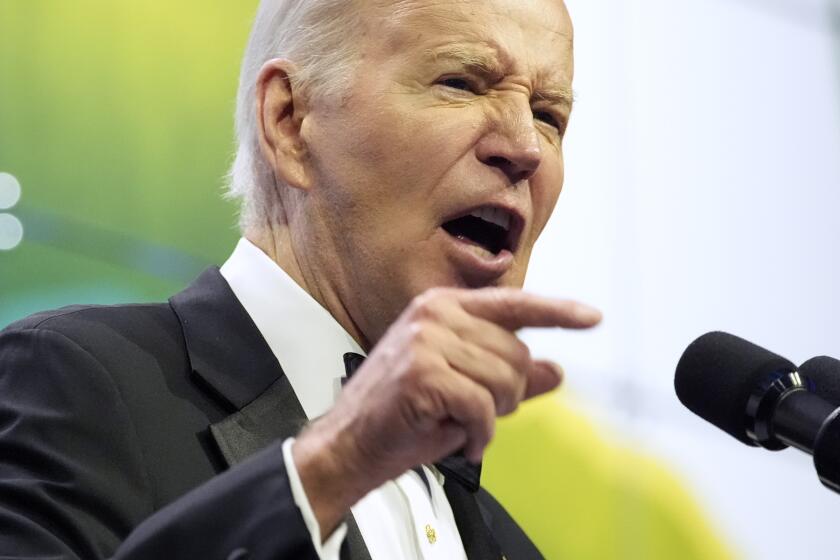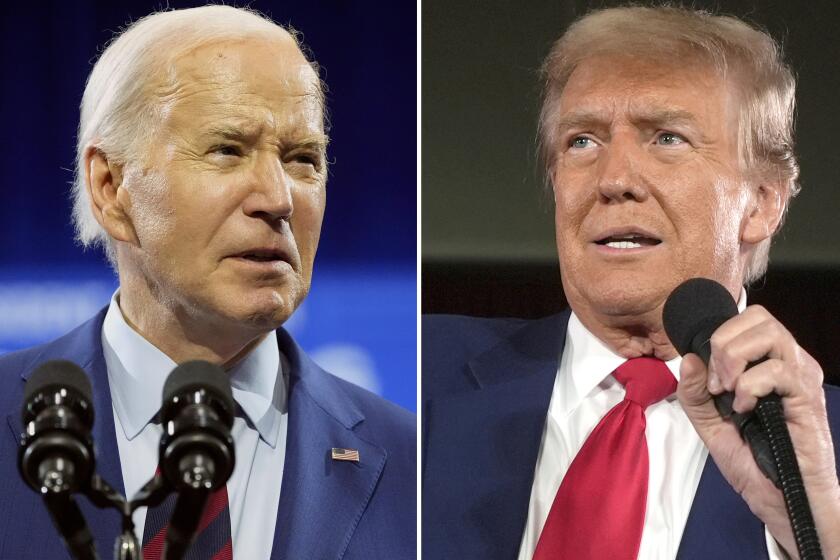Iran sanctions need work, some in Israel say
Even as Israel rallies other nations to boycott Iran, its own commercial sanctions against the Islamic Republic are outdated, vague and poorly enforced, say lawmakers and legal analysts in Jerusalem who are pushing the government to strengthen such measures.
The effort took on added urgency last month after an embarrassing U.S. crackdown on Ofer Bros. Group, one of Israel’s largest conglomerates, which the State Department found had violated American sanctions against Iran by using a Singapore subsidiary to sell an oil tanker to an Iranian front company.
Ofer-controlled ships have also transported oil to and from Iran several times over the last decade, the Tel Aviv-based company acknowledged.
Israeli lawmakers expressed outrage over the activities, saying they damage the nation’s credibility as it attempts to forge an international consensus to block Iran’s nuclear program, which Western officials fear is aimed at developing weapons.
The developments also exposed apparent weaknesses in Israel’s boycott efforts. Many here believed any kind of trade with Iran was prohibited by Israeli sanctions, but now there’s now a debate over whether Ofer’s activities, mostly conducted through foreign companies it controls, actually violated existing Israeli law.
“There are some loopholes that we have to look into,” said Aryeh Eldad, a lawmaker from the right-wing National Union party who has called for a government investigation of Ofer. “We can’t demand that everyone else in the world boycott Iran when one of our leading commercial giants is making regular visits to an Iranian port. It’s ridiculous. We should set the example for the whole world, if for no other reason than as a symbol.”
Israel’s main law banning commerce with Iran stems from a 1939 British Mandate rule against “trading with the enemy,” which was originally intended to be used against Nazi Germany and was adopted by Israel upon its independence. Under the law, trade is banned with a list of “enemy states.” After a 2000 Israeli Supreme Court ruling, Iran was added to the list, which also includes Lebanon and Syria.
It’s a simple and sweeping law, legal experts say, but it has failed to keep up with the globalization of commerce. The law focuses chiefly on Israeli companies and citizens, and on goods exiting or entering Israel, so it’s unclear whether foreign subsidiaries or trade that bypasses Israel — such as the kind Ofer engaged in —is covered.
Ofer representatives have denied knowingly violating U.S. sanctions or Israeli law. The company’s supporters initially suggested it had special permission from the government to dock in Iran, hinting it was for national-security reasons. The company later backed away from such claims, which the Israeli government still denied.
Critics say current law also does nothing to restrict Israeli companies from conducting business with firms that, in turn, profit from their dealings with Iran. Such measures have been a growing focus of international sanctions policies.
“Israeli law is still focused on Israeli companies doing business with Iran,” said Rifat Azam, an international business law expert at the Herzliya-based Interdisciplinary Center. “But the focus should be more on foreign companies.”
He noted that while other Western nations have updated and strengthened their sanctions against Iran in recent years, Israel relies mostly on a law crafted before the nation was founded. As a result, he said, U.S. and European sanctions against Iran are tougher and more explicit than Israel’s.
“Our situation is somewhat absurd,” Azam said. “Our main relevant legislation isn’t even ours originally, but was passed by the British Mandate.”
In an attempt to beef up sanctions against Iran, the parliament, or Knesset, in 2008 passed a law — backed by then-opposition leader and current Prime Minister Benjamin Netanyahu — restricting Israeli financial institutions from investing in firms that do business with Iran’s energy industry or have more than $20 million in trade with firms dealing with Iran.
But the law has yet to be fully enforced, government officials say, in part because of confusion over the meaning of certain terms.
The law also allowed for the creation of a blacklist of banned companies, similar to one used by the U.S. in its recent enforcement action against Ofer. Israel’s list has not been finished, according to the Finance Ministry.
Knesset members are working on legislation to clarify and extend the 2008 ban. The proposed new ban would apply not only to financial institutions making investments in firms linked to Iran, but also to all kinds of companies and government agencies, regardless of whether they are based in Israel, that are conducting substantial business with firms also active in Iran.
Similar policies are already in place in the U.S. and Europe. For example, in 2009, Los Angeles Metropolitan Transportation Authority officials publicly questioned whether it would be appropriate to award Siemens Corp. a $300-million contract for light-rail cars, citing the German company’s business ties to Iran.
Yet Siemens recently won contracts to work on Israel’s Ben-Gurion International Airport and Ashdod port.
“It’s hypocritical,” said Yossi Melman, a Haaretz newspaper columnist who has been writing about the issue for several years. “Where is the moral standing?”
He said lax enforcement is part of the problem and that even under Israel’s current laws, authorities could crack down harder if they wanted to.
In 2009, for example, government officials tried to prevent an Arabic-language book vendor from using third-party countries to import titles originally published in the “enemy states” of Lebanon and Syria, arguing the practice violated the “trading with the enemy” law.
Melman said a case could also be made against Ofer.
“The point is that even under the existing law, there could be a case brought,” he said. “At least there could be an argument about it. But so far there’s not even an investigation.”
Government officials said they were examining whether to launch a formal investigation into Ofer.
Though Israel and Iran have been enemies for decades, business ties have continued, often in secret, experts say. In 1998, Israeli businessman Nahum Manbar was sentenced to 16 years in prison for selling chemicals used for the Islamic Republican’s mustard and nerve gas weapons. But because Iran had not yet been added to the trade law’s “enemies list,” he was convicted on other charges.
Sales of military equipment to Iran are tightly monitored, but scores of other companies still find ways around Israel’s trade restrictions, exporting fertilizers and cow hormones and importing pistachios and marble, mostly using third-party intermediaries in nations such as Turkey or the United Arab Emirates, experts say.
“Israelis like to have their cake and eat it too,” Melman said. “But it’s embarrassing. We can’t keep turning a blind eye.”
Batsheva Sobelman in The Times’ Jerusalem bureau contributed to this report.
More to Read
Start your day right
Sign up for Essential California for news, features and recommendations from the L.A. Times and beyond in your inbox six days a week.
You may occasionally receive promotional content from the Los Angeles Times.






